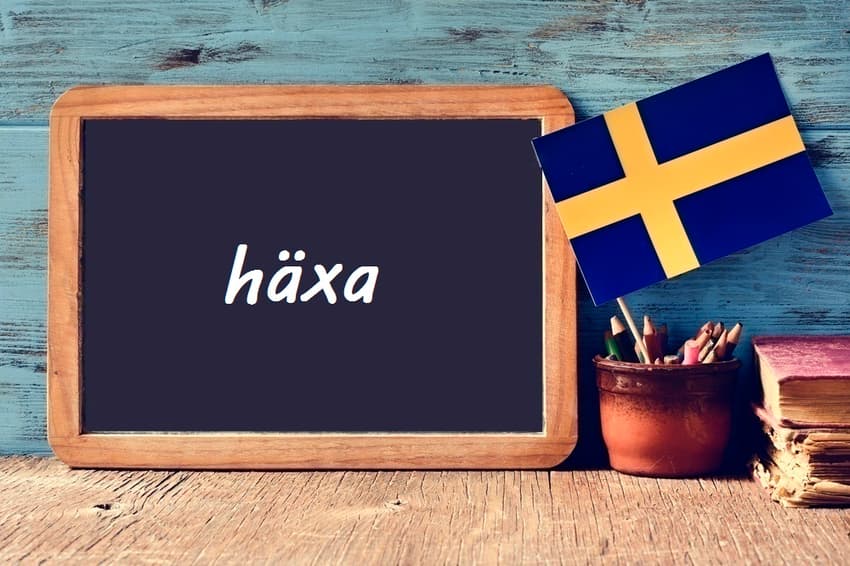Swedish word of the day: häxa

As Halloween approaches, we're taking a look at some spooky Swedish words, how to use them, and the history behind them.
Häxa is translated in English as 'witch', and the plural is häxor (witches).
It refers to women with magical powers, and is much more common than trollpacka and trollkvinna, which are the female forms of trollkarl (wizard).
There are plenty of compound words built using häxa. Häxkonst and häxeri both mean 'witchcraft', and häxa has a male form, häxmästare, which could be translated as 'enchanter', but this is uncommon.
As in English, a häxjakt (witch hunt) can refer both to the persecution of women due to their supposed magical powers and to the persecution more generally of any innocent person, simply for the sake of having someone to demonize. Two more related words are häxprocess (witch trial) and häxbränning (witch burning), which are only used to refer to the historical witch hunts.
Witch purges took place in Sweden around the 17th century, including the country's largest witch trial in Torsåker, northern Sweden, where 65 women and six men were beheaded and burned.
The word häxa entered the Swedish language around the same time as these trials were taking place, coming from hex in Low German. It was actually first used as a legal term in these trials before it became part of the general lexicon. These words actually share a root with the English term 'hag'. Before the 17th century, trollpacka (or trollbacka as it was originally written) was the usual term in Swedish.
One more important thing to know: häxa is sometimes used as a derogatory term for women, including in words like rymdhäxa (literally 'space witch', used as an insult aimed at female flight attendants) and batikhäxa (batik witch, a rude term used about politically engaged women).
Examples
Många barn klär ut sig till häxor på Halloween
Lots of children dress up as witches on Halloween
Alla trodde att hon var en riktig häxa
Everyone thought she was a real witch (Note: depending on context and tone, this could either mean people genuinely thought the woman in question had supernatural powers, or it could be a derogatory insult)
Do you have a favourite Swedish word you would like to nominate for our word of the day series? Get in touch by email or if you are a Member of The Local, log in to comment below.
Comments
See Also
Häxa is translated in English as 'witch', and the plural is häxor (witches).
It refers to women with magical powers, and is much more common than trollpacka and trollkvinna, which are the female forms of trollkarl (wizard).
There are plenty of compound words built using häxa. Häxkonst and häxeri both mean 'witchcraft', and häxa has a male form, häxmästare, which could be translated as 'enchanter', but this is uncommon.
As in English, a häxjakt (witch hunt) can refer both to the persecution of women due to their supposed magical powers and to the persecution more generally of any innocent person, simply for the sake of having someone to demonize. Two more related words are häxprocess (witch trial) and häxbränning (witch burning), which are only used to refer to the historical witch hunts.
Witch purges took place in Sweden around the 17th century, including the country's largest witch trial in Torsåker, northern Sweden, where 65 women and six men were beheaded and burned.
The word häxa entered the Swedish language around the same time as these trials were taking place, coming from hex in Low German. It was actually first used as a legal term in these trials before it became part of the general lexicon. These words actually share a root with the English term 'hag'. Before the 17th century, trollpacka (or trollbacka as it was originally written) was the usual term in Swedish.
One more important thing to know: häxa is sometimes used as a derogatory term for women, including in words like rymdhäxa (literally 'space witch', used as an insult aimed at female flight attendants) and batikhäxa (batik witch, a rude term used about politically engaged women).
Många barn klär ut sig till häxor på Halloween
Lots of children dress up as witches on Halloween
Alla trodde att hon var en riktig häxa
Everyone thought she was a real witch (Note: depending on context and tone, this could either mean people genuinely thought the woman in question had supernatural powers, or it could be a derogatory insult)
Join the conversation in our comments section below. Share your own views and experience and if you have a question or suggestion for our journalists then email us at [email protected].
Please keep comments civil, constructive and on topic – and make sure to read our terms of use before getting involved.
Please log in here to leave a comment.